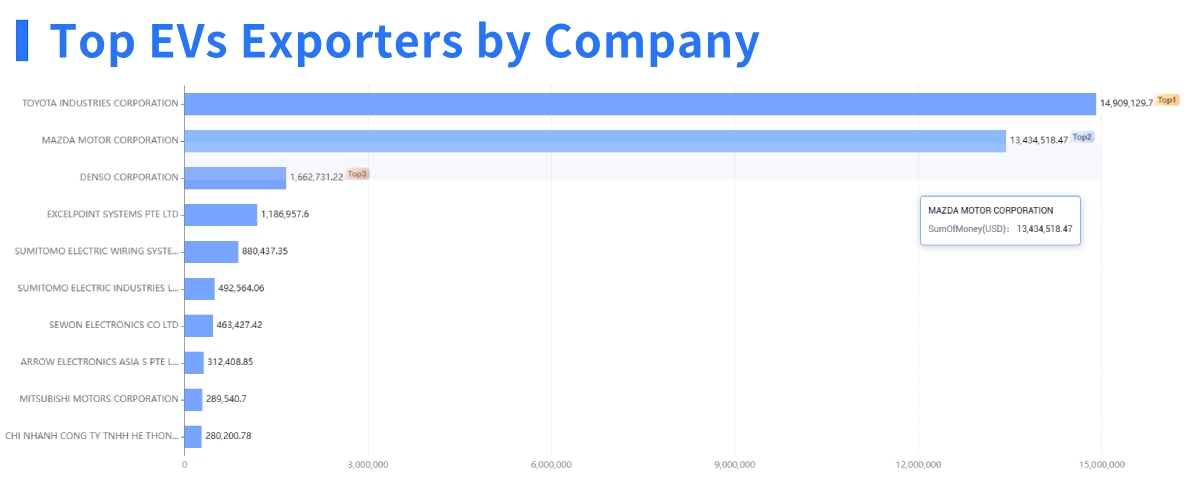 Trade Trends News
Trade Trends News
 2025-07-18
2025-07-18
Japan's imports reached $775 billion in 2024 in total, marking a 5.6% increase from 2023, while exports hit $730 billion, reflecting a 3.4% growth, according to Japan's Ministry of Finance. Tendata reveals critical trends for automotive businesses targeting the Japanese market.

Top 5 Japan's Imports:
Mineral Fuels ($160 billion, 20.6%)
Mineral fuels dominate Japan's imports, with crude oil and liquefied natural gas (LNG) being the primary drivers. Given Japan's energy needs, this sector continues to play a key role in its overall import activity.
Electrical Machinery ($140 billion, 18.1%)
Electrical machinery, including semiconductor devices and components for electric vehicles (EVs), remains a significant import category. Japan's growing digital economy drives this demand.
Automobiles ($80 billion, 10.3%)
Automobiles are a crucial part of Japan's import economy, with a large share coming from the United States and Germany, meeting the needs of Japanese consumers for a variety of vehicle types, especially luxury cars and electric models. -Pharmaceuticals ($55 billion, 7.1%)
Japan’s robust healthcare system ensures consistent demand for medical and pharmaceutical imports. The demand for vaccines and high-tech medical devices is on the rise due to Japan's aging population.
Industrial Machinery ($52 billion, 6.7%)
As Japan modernizes its manufacturing infrastructure, imports of industrial machinery continue to grow, with particular demand for robotics, automation systems, and high-precision equipment.

>>>> Get Report of Japan's Imports <<<<
Fastest-Growing Sectors:
Electric Vehicles (EVs): 27.4% YoY growth
The demand for electric vehicles continues to surge as Japan pushes for carbon neutrality by 2050. EV imports saw a significant rise as both consumers and the government embrace sustainable mobility solutions.
Renewable Energy Equipment: 23.6% YoY growth
As Japan commits to its 2050 net-zero target, the demand for solar panels, wind turbines, and related technologies is experiencing rapid growth.
"The shift to sustainable energy and green technologies is driving Japan's increasing demand for renewable energy equipment, including solar panels and wind turbines."

>>>> Know more about Japan's Imports <<<<
Key Trading Partners:
China (24.1% share)
China remains Japan's largest trading partner, especially in the import of raw materials and electronics. The growth of the Chinese economy continues to support robust trade relations with Japan.
United States (16.8% share)
The U.S. is a major supplier of automobiles, medical equipment, and agricultural products to Japan. Trade agreements continue to evolve, benefiting the automotive and healthcare sectors.
South Korea (8.5% share)
South Korea plays an essential role in supplying electronics, machinery, and automotive components to Japan. The two countries have strengthened their economic relationship in recent years.
"With China supplying a large share of Japan's imports, U.S. automotive exporters looking to enter Japan should focus on leveraging partnerships with established Japanese distributors to navigate local market preferences."

>>>> Market Report of Japan's Imports <<<<
Japan's growing demand for electric vehicles (27.4% growth) presents a significant opportunity for automotive suppliers, particularly those focusing on EV parts, battery technologies, and related infrastructure. The shift towards greener technologies also opens the door for suppliers of renewable energy equipment, such as EV chargers and solar-powered carports.
Use Tendata to analyze Japan's trade data by HS code and identify potential buyers in the automotive sector. By leveraging precise market insights, suppliers can connect with the right partners and capitalize on the country's transition to green technologies.
Category
Leave Message for Demo Request or Questions


 T-info
T-info T-discovery
T-discovery

 My
Tendata
My
Tendata Market Analysis
Market Analysis Customer
Development
Customer
Development Competitor
Monitoring
Competitor
Monitoring Customer Relationship
Customer Relationship





































































































































